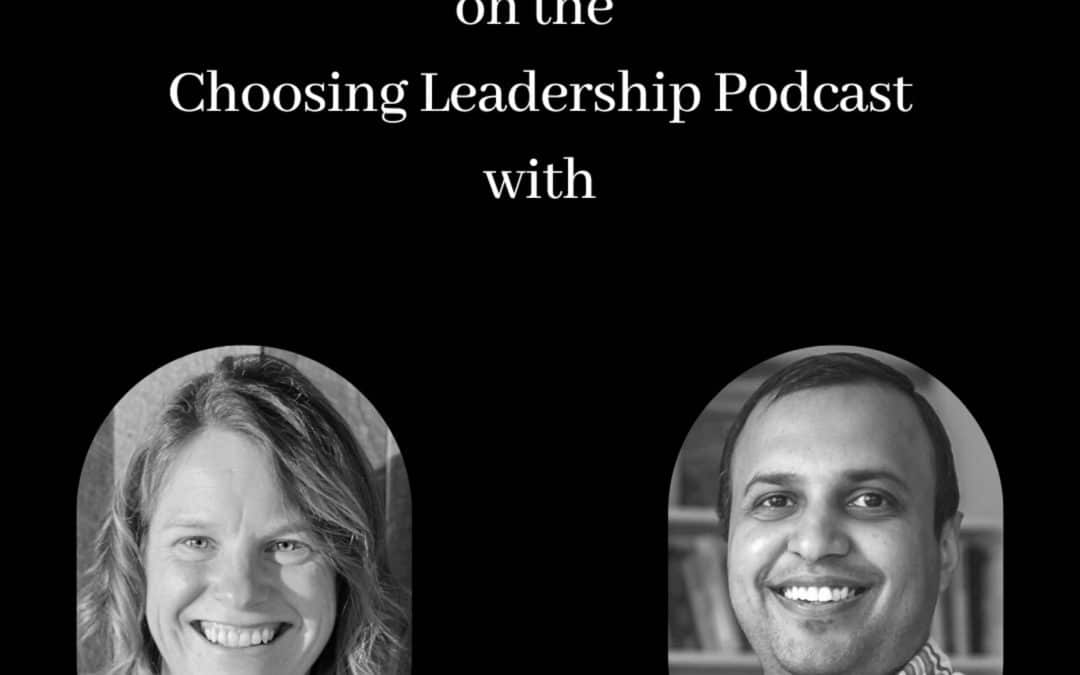This is the Humble Inquiries series. In this episode, Leslie joins me as my co-host to humbly inquire into overwhelm – the feeling of too much to do and too little time – which is a very timely one as we find ourselves in new ways of working. Co-hosted with Leslie Wireback on the Choosing Leadership podcast
In each episode of Humble Inquiries, we are deliberately going to put ourselves in the uncomfortable space of not knowing the answer and humbly inquiring about these challenges – with the aim to provoke new thoughts, actions, and practices – to help us better serve our coaching clients, and also to help the leader in you navigate the biggest challenges – at life and at work.
Show Notes
- Sumit – “we see doing more as a badge of honour. we feel that if we are not doing more, if you’re not doing more than our peers, then that’s somehow a weakness or a sign of not being a good professional.”
- Sumit – “overwhelm and having this sense of too much to do is basically an invitation to ask better questions”
- Leslie – “What do you care about? What are your priorities, really stepping back and looking at that whole big picture and making adjustments – not just once but regularly”
- Sumit – “What I’ve found is that I do not have time is always a lie. I think a better, more accurate representation, would be that this is not my priority. “
- Sumit – “I do not have time is never the whole truth. There is something deeper beyond that. “
- Leslie – “I fell in the trap of my work hours needed to be eight to four, eight to five something typical, whereas that doesn’t necessarily work well or serve me well each and every day”
- Sumit – “the first element of really asking ourselves what is the cost of operating this way? And is that okay with me? And if that’s okay with you, then yes, wonderful. Continue on that journey. But if you identify that something is missing and that is not okay. Then the question is staring in your face.”
- Leslie – “saying no feels rude. And so then I don’t want to say no, I care too much. And I want to help people and saying no is going to disappoint them. Whereas., if I don’t say no, I may be disappointing myself or someone else because of I’m creating a conflict and an inability to manage all that I have to do.”
- Sumit – “No, is the most powerful word. And also one which most people find it difficult to speak.”
- Sumit – “A NO doesn’t mean that you are rude doesn’t mean that you are polite. Doesn’t mean that you’re hardworking doesn’t mean that you’re not hardworking. It doesn’t mean anything unless you make it mean, meaning something. So a no is a simple word. No is a full sentence in itself. “
- Leslie – “it might take the leader being vulnerable and saying I can’t get it all done. I need help. And that. Your team might finally say, thank you for admitting this, that as a team, they’re all drowning too.”
- Sumit – “It’s only about managing your priorities and then your energy”
- Sumit – “To realize that everybody has 24 hours, no matter what they do, whether I am an employee as an individual contributor, whether I am a manager of whether I am a president of a country, everybody has 24 hours, not a second more, not a second less for me, realizing that is a very empowering and liberating feeling.”
- Sumit – “is it that my time owns me? What is it that I own my time? I do. I get to choose what, and where I spend my time because everybody has 24 hours. The only question. How are you prioritizing? What are you saying? Yes. To what are you saying No to”
- Leslie – “as a leader, do you look at the gifts of the individuals on your team and kind of reshuffle responsibilities?”
- Leslie – “the stories you tell yourself on the assessment you’re making of, I’m not good at my time management or I’m not good at saying no, all of that, questioning it and changing it to have a different perception”
- Sumit – ” every courageous act is a vulnerable act as well.”
As quoted by Edgar Schein in his book Humble Inquiry, an humble inquiry is recognizing that insights most often come from conversations and relationships in which we have learned to listen to each other and have learned to respond appropriately, to make joint sense out of our shared context, rather than arguing with each other into submission.

